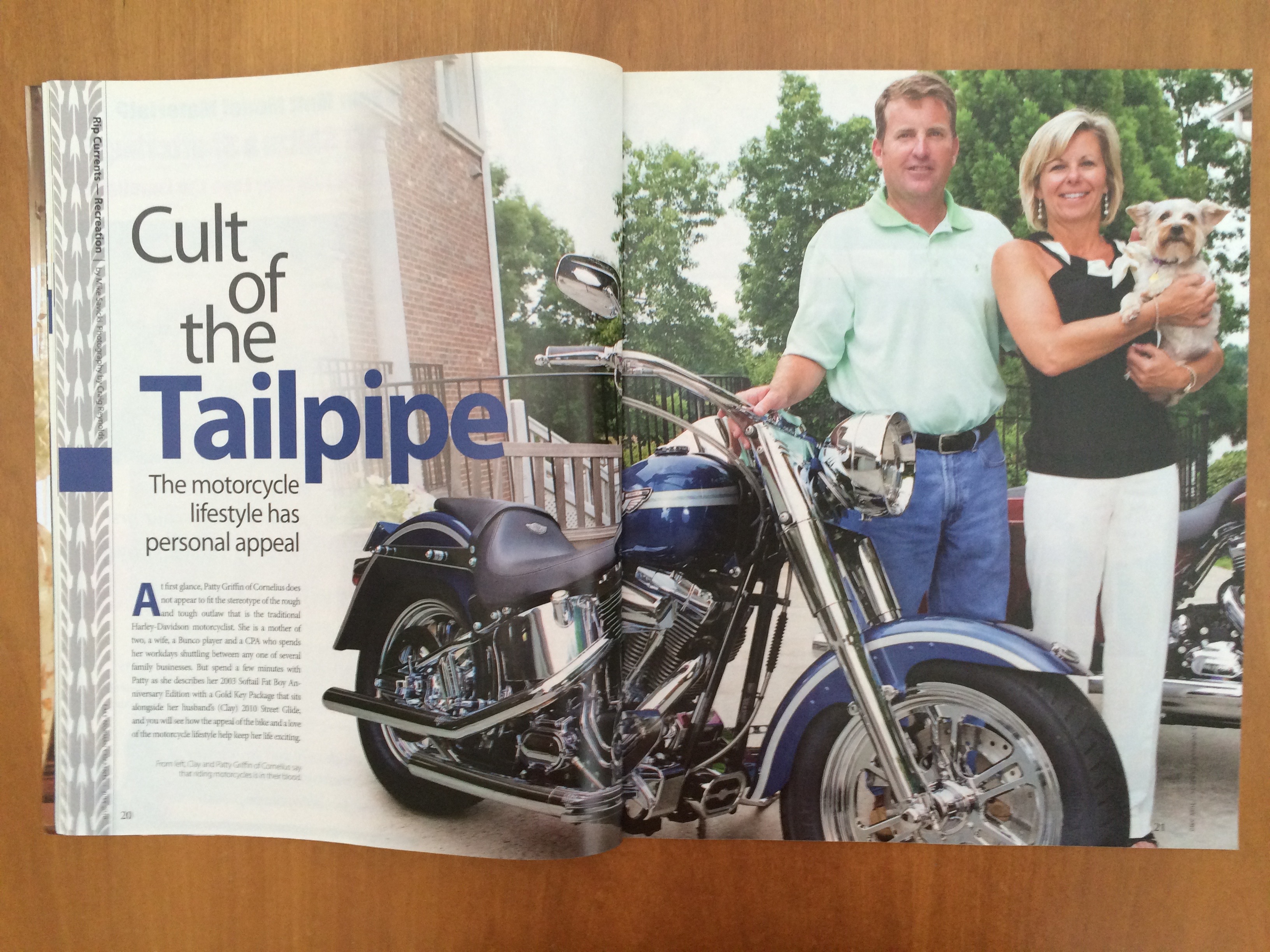Cult of the Tailpipe
A motorcycle lifestyle has personal appeal
By Mike Savicki
At first glance, Patty Griffin of Cornelius does not appear to fit the stereotype of the rough and tough outlaw that is the traditional Harley-Davidson motorcyclist. She is a mother of two, a wife, a Bunko player and a CPA who spends her work days shuttling between any one of several family businesses. But spend a few minutes with Griffin as she describes her 2003 Softail Fat Boy Anniversary Edition with a Gold Key Package that sits alongside her husband, Clay’s, 2010 Street Glide, and you will see how the appeal of the bike and a love of the motorcycle lifestyle helps keep her life exciting.
Handling a 700-pound Harley is no easy task, but Griffin says living the lifestyle and traveling with friends and family makes it worth the effort. She explains, “About seven years ago, a group of about twenty of us from around here just started buying motorcycles one right after the other. It became a group thing. We all went to the Daytona rallies, we went to Key West a couple of times and we loved to take off anywhere together. I was glad to get back into it since I rode as a kid and remembered the freedom it gives me.”
Freedom is a word that Robert Yates, retired owner of legendary Robert Yates Racing, also uses to describe his lifelong hobby. “I can’t even begin to describe the freedom you feel when you ride. You really learn to understand how weather works when you are on a bike and you learn to be aware of everything going on out there. It is a far different experience from being in a car,” Yates offers. “To me, riding where there is no one else on the road gives me complete freedom.”
Harley living through the years
Perhaps no one better understands the unique appeal of the lifestyle and the lure of the open road than Don Tilley, owner of Tilley Harley-Davidson. Listening to him describe how society’s perception of motorcycles has changed through the years, and what it means to ride, is like hearing a living legend share the story of his life. Motorcycles, according to Tilley, are now a cult that appeals to everyone.
Don Tilley begins, “I have been in this business all my life and remember back in the early sixties when things were tough if you were a biker. If you rode a motorcycle then you were a roughneck and a bad character. If you rode a motorcycle and had a black leather jacket, well, people thought you were bad news even if you weren’t.”
He says the perception began to change during the eighties. Tilley continues, “By 1985, when the economy improved, that’s when the rich urban bikers first got into riding. And so did the women. It wasn’t for rebels anymore. When 1988 hit, I had a one-year-long waiting list for a new Harley. Motorcycles got respectable and it really took off.”
Tilley says that with the increased popularity came a better understanding of what it means to ride. The stereotype was gone. “People began to see that motorcycles are a great escape,” he adds. “Even today, if I get frustrated, I jump on a motorcycle and take a ride through the country. I come back with a different attitude. There is something about it that blows your troubles away. That’s what brings us all together.”
Coming together as one
Patty Griffin, Robert Yates and Don Tilley all agree that the motorcycle community is a diverse group that shares a love of the machine and a sense of adventure. And through the years, they believe, bike nights have become a popular way for enthusiasts to come together as one.
“I like to think it’s the cheap beer, good food and music that brings in the crowd,” states Kristin Wicklund, general manager of Mac’s Speed Shop in Cornelius. “But bikers will travel from almost anywhere for bike night to see each other’s bikes and talk about what they have done to them. Anything that’s free wheeling is welcomed. It’s the kind of thing people like to do together whenever they can.”
Robert Yates says the bike crowd is an extraordinary group that most people never take the time to meet. “Ninety-nine percent of the motorcyclists are in it for discovery, to see this country and to add to their lives,” Yates asserts. “There’s no better way to see this country than on a bike and, in my opinion, there’s no better place in the world to ride than on our piece of land.”
While some motorcyclists come and go, others stay with it for a lifetime. “I think I’m like the last of the Mohicans now,” Patty Griffin concludes as she reflects on how some friends have moved away from riding. “Mostly everyone else around here sold their motorcycles, but when my husband and I became empty nesters, we looked at each other and thought back to all the trips we took together and how much fun we had. We decided there was no reason we shouldn’t be doing this again. We know it is in our blood.”
This article was originally published in the July 2010 edition of Currents Magazine.

